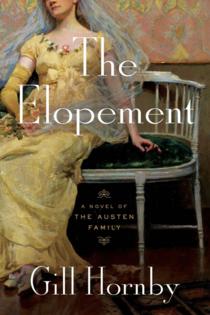Review: Fans of TV series 'Miss Austen,' 'The Elopement' is for you
Published in Books News
Does this amuse you? “She gave an unnatural little laugh — one she had taken to using with her stepchildren as a signal that humour had been committed, and any consequent mirth would not be discouraged. In the silence that followed, Fanny laughed long and alone."
I get a bang out of that pressed-and-starched description, from Gill Hornby’s “The Elopement.” But I recognize that it’s a fairly specific brand of dry humour — sorry, humor — and that the writing, which is a clever pastiche of the style of Jane Austen, won’t be to all tastes. But if you’re amused by that drollery, and if you’re a fan of Austen or the recent PBS series “Miss Austen” — which was based on a Hornby novel — I bet you’ll cotton to “The Elopement.”
Subtitled “A Novel of the Austen Family,” “The Elopement” takes place a couple of decades before “Miss Austen,” in which Jane’s sister Cassandra tried, “Emma”-like, to arrange the romances of her relatives while also struggling to preserve her late sister’s literary legacy. Hornby created a bold heroine with Cassandra, who was passionate, self-effacing and ahead of her time but also felt like a part of it.
The bad news for Cassandra fans is that she’s barely in “The Elopement,” set a few years after Jane Austen’s 1817 death. A couple of Austens pop in but the new book is primarily about the Austen sisters’ niece Fanny and Fanny’s stepdaughter Mary. As ever, both face questions of love and money.
As that opening wisecrack demonstrates, Hornby has a fine sense of Austen’s language and wit. “The Elopement” slides effortlessly into the world of two centuries ago, with its calling cards, corsets and head colds that quickly become fatal.
We may be vexed by the dictates of long-ago manners (“Mary was not sure how or why this decision was reached — it was her lot to be moved through life as a piece on a chess board — but still it delighted her"). But we understand why these characters behave the way they do because Hornby immerses us so fully in their sensibilities.
One of the delights of Austen is her gift for misdirection, where it only becomes clear in the final pages of, say, “Sense and Sensibility” that Edward was in love with Elinor all along. Hornby excels at that, too, even though her book’s title seems to be a spoiler.
In part, that’s because the main character of “The Elopement” is in doubt for most of the book. It seems to be Fanny (Austen fans have been conditioned to be wary of women with this name, which will serve them well here), who marries for money and turns her back on her own family, including her brother Ned. Fanny may be the only person in “The Elopement” who can’t see that Ned is falling for her stepdaughter Mary. And, in the Austen universe, if you don’t understand love, then you’re doomed to be ridiculed and/or hated.
As Mary’s perspective takes over the second half of “The Elopement,” the book gets stronger. The protagonists of novels don’t have to be likable, of course, and Fanny decidedly isn’t. But these characters are inspired by actual people that the Austens knew and there’s a sense that the author feels stuck with Fanny.
It’s not a huge problem. The verve of Hornby’s prose and the skill with which she creates Austen’s era carry the book along. That’s good news for readers and for TV viewers, since PBS already has announced a “Miss Austen” sequel.
____
The Elopement
By: Gill Hornby.
Publisher: Pegasus, 470 pages.
©2025 The Minnesota Star Tribune. Visit at startribune.com. Distributed by Tribune Content Agency, LLC.













Comments